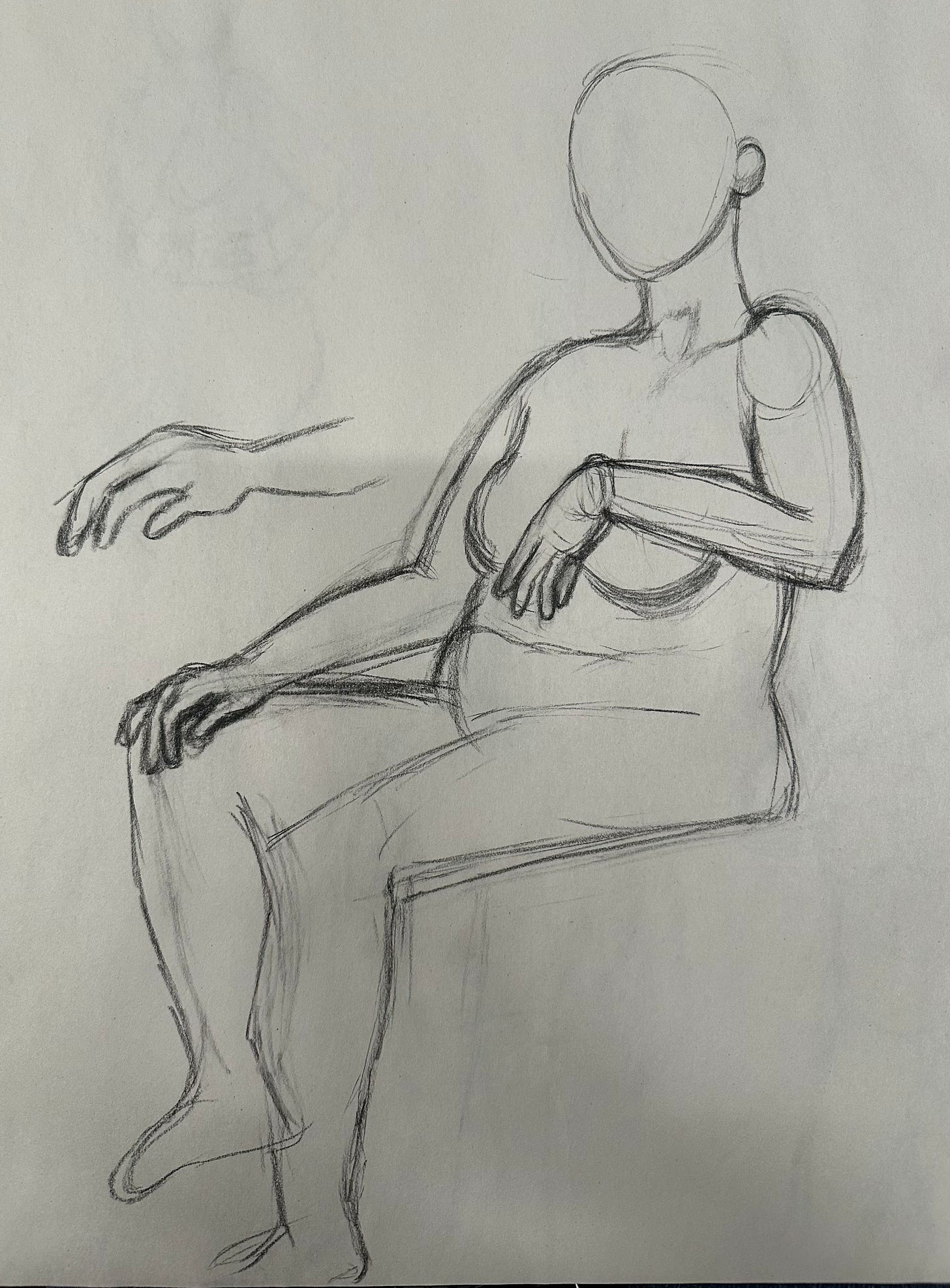This too shall pass, and other useful reminders for when life gets tricky
And a bonus peek at some of my sketches from art class
This week my art teacher was in the middle of explaining how to sketch the human head when he caught himself about to say, “This is the rule I use for drawing heads” and instead said, “There is only one rule in life, and everything else is just a guideline.”
Immediately, he had everyone’s attention. We were all on the edge of our seats waiting to hear the one rule in life. (Forget learning the guidelines on drawing heads!) And after a dramatic pause, he said:
It’s that no matter what, this too shall pass.
If it’s a bad drawing, you’ll move onto the next one in due time. If it’s something really great that’s happening to you, that’s also ephemeral. If it’s something tough, that will also pass eventually.
I will say that art class was not the place I expected to be reminded of this wisdom. While it isn’t something that I particularly need in this moment, I did end up passing this on in a few conversations this week.
And with that advice in mind, I thought I’d share a few of my pieces from the past few weeks, from newest to oldest. Hopefully improvement/progress is evident, and if not, I will remind myself that this too shall pass. No one will remember my bad drawings by the time I send out my next newsletter, right…?



Alongside the art class wisdom, I’ve found myself coming back to another piece of advice:
Understand what is and isn’t within your control, and focus on the parts that are in your hands. Don’t dwell unnecessarily on the rest.
A few weeks ago, I wrote about overcoming failure and this is somewhat related. I have a few friends who have been on the job market for a few months now, and they’ve all faced many rejections at various stages of the recruiting process. One of them asked me yesterday, “When do I just give up, because maybe it’s something wrong with me?” When faced with this, I didn’t know how to respond right away. It was such a strongly worded question that encapsulated so many complex emotions.
After taking a deep breath, I responded with two thoughts: “What would you be excited to do instead if you didn’t pursue jobs in this direction?” and “Once you’ve done your part to improve and work on everything within your control, not succeeding isn’t a reflection on you. It’s the product of the broader context and circumstance that isn’t within your hands.”
I led with the open-ended question because I wanted to redirect from the concept of giving up and set a more positive tone. I followed with my philosophy to make it clear that this sort of thinking isn’t the right path to go down. I spent a while explaining this philosophy to my friend – in this context, there are macroeconomic trends, opaque hiring processes and success criteria, and a lack of visibility into other candidates and what they bring to the table. I told her, you can sit around all day wondering and surmising at these questions but you’ll never know the answer and therefore, you can’t change what you’re doing with any certainty that it’s the right place to invest.
As I reflected on this more, two other instances came to mind where the same philosophy reigns supreme. The first one was while we did our annual planning at work at TestBox. Our first year, we set OKRs and goals around revenue and fell short of those goals.
At the end of a year of feeling like we’d utterly and entirely failed, we shifted our OKR and goal setup to include:
What we wanted the team to accomplish (which was within the team’s own control), and also:
What broader results we hoped that would accomplish.
Separating out the two concepts was a gamechanger in team morale. There’s a huge leap between the team achieving its goals of launching X marketing campaigns or delivering Y product features to securing a certain amount of revenue. The former could be entirely accomplished, but due to external factors such as the macroeconomic environment and shifts in software buying trends, it could still lead to falling short of the latter.
The other instance where this wisdom came to light was in a catchup with a friend. She was telling me about how she’d seen some pictures of her ex with a new girlfriend, and it had led her down this rabbit hole of unhappiness. She started to wonder what he was thinking and why he was behaving a certain way. When she brought this to her therapist, her therapist pointed out: “You’re hoping for certain answers to those questions. But you’ll never really know the answers, and even if you did, would it change your course of action?” She admitted that she wouldn’t behave any differently even if she knew. She was grasping for answers that were out of her control, and they weren’t going to impact her ability to make the best choices for herself going forward.
Tl;dr
If you remember nothing else, take this away with you:
This too shall pass.
Understand what is and isn’t within your control, and focus on the parts that are in your hands. Don’t dwell unnecessarily on the rest – it won’t help you.

